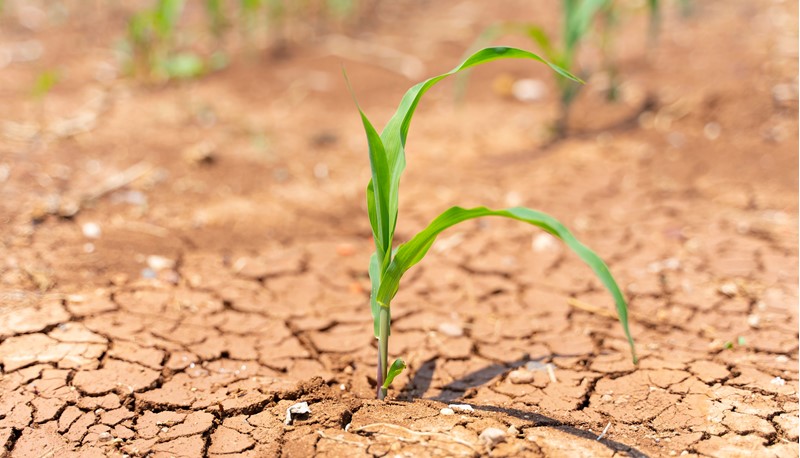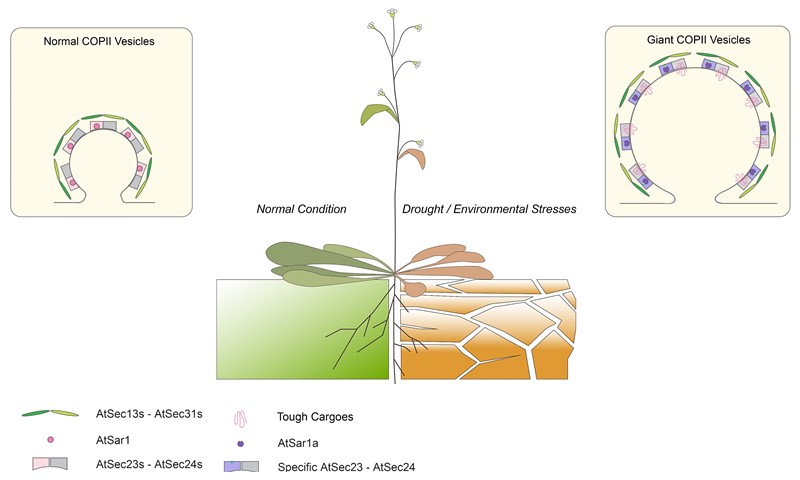
A biotech breakthrough unlocking the secrets of stress-resistant crops

Understanding how plants naturally survive under stress is essential in improving the future production yield of crops.
Drought-resistant crops are a vital puzzle piece for achieving food security on our warming planet. Now, a breakthrough discovery from CUHK’s life scientists has significantly advanced our understanding of crop resilience by uncovering how plants adapt their internal ‘transport systems’ for proteins in response to extreme stress. Results have been published in Nature Plants.
‘People react differently to stress and so do plants. Plants have developed various counter mechanisms to subdue the stress caused by extreme environments,’ says Prof. Liwen Jiang, Director of the AoE Centre for Organelle Biogenesis and Function at CUHK. For instance, some plants will shed leaves or close their pores to reduce water loss to increase the chance of survival. However, details of how these mechanisms are activated is not fully clear. Understanding how plants naturally survive under various stresses is essential in improving the future production yield of crops.
Mapping the mechanisms of plant cell biology
Prof. Jiang’s project concerns transport vesicles, which are small fluid-filled membrane-bound structures within plant cells that carry out the process of secretion, uptake and transport of materials between organelles of the cell. It focused on how plants produce a particular type of vesicle known as a COPII vesicle, which is critical to the trafficking of vital proteins within a plant.
The study made a major breakthrough by identifying the existence of giant COPII vesicles, twice the size of a normal COPII vesicle, which package a large number of stress-relevant membrane proteins to their destination in order to trigger survival mechanisms and relieve the plants from drought-related stresses.

The study has shed new light on giant COPII vesicle formation upon stress regulation.
Prof. Jiang explains, ‘COPII vesicles respond variously and carry a precise selection of protein according to different levels of drought. As an analogy, numerous larger vehicles filled with stress-relevant membrane proteins will be arranged to the specific destination under extreme drought conditions, while less stress-relevant membrane proteins will be carried under mild drought conditions.’
The project also identified the specific protein, AtSar1a, that regulates the induction of giant COPII vesicles. Taken together, these discoveries could support the development of more drought-tolerant crops, and thus contribute to environmental sustainability.
A discovery years in the making
The research team made this breakthrough by artificially reconstituting COPII vesicles using plant-derived materials in vitro for the first time, drawing on a combination of biochemical, cellular, molecular and protein analysis approaches as well as cutting-edge electron microscopy techniques. They realised the fruits of a decade-old collaboration with Prof. Randy Schekman, 2013 Nobel Laureate in Physiology or Medicine, in which the team learnt the techniques of in vitro reconstitution.

A mobile VR application is designed to innovate students’ learning experience in plant cell biology.
The study is the latest in a series of research initiatives in plant cell biology carried out by CUHK under the Areas of Excellence scheme of the University Grants Committee in Hong Kong. Apart from research, the team has also produced a mobile VR application that allows students to explore and interact with plant cell organelles in a dynamic 3D environment, innovating the learning experience.
Read more: